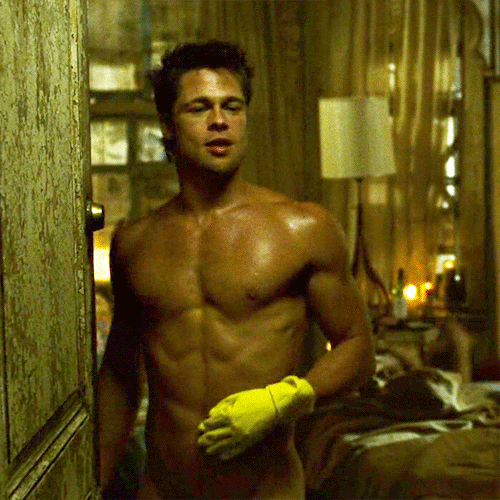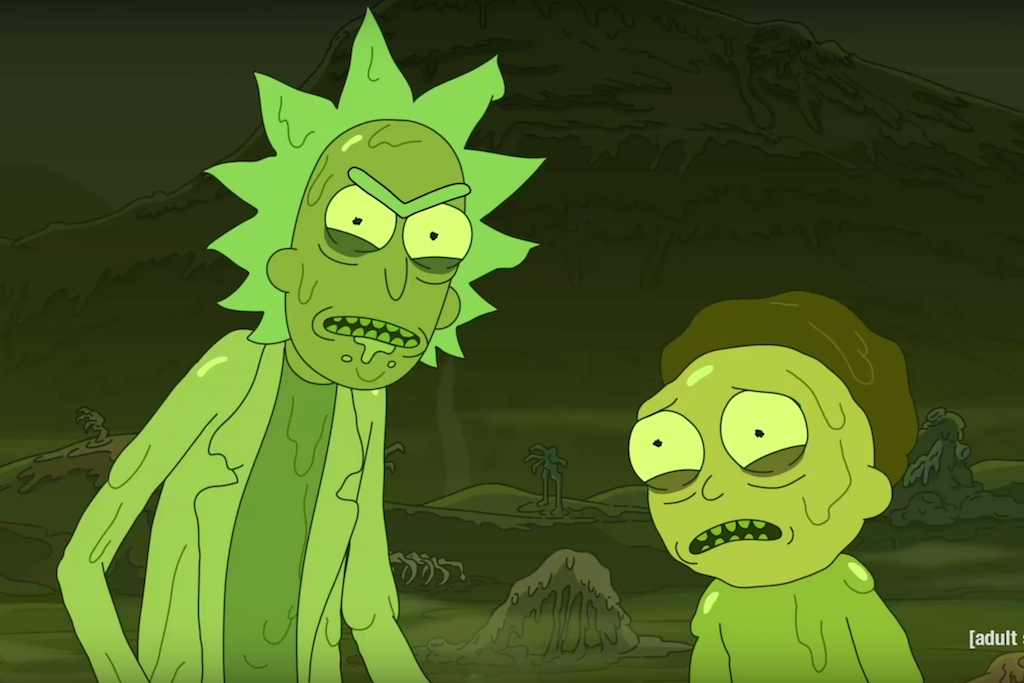‘Fight Club’ Fans Have Ruined The Film’s Legacy
For many bros, watching 'Fight Club' is a red-pill revolution - and so they have to tell everyone they know.

For most of us, even a fleeting mention of Fight Club inspires eye rolls, but it wasn’t always this way.
Released in 1999, David Fincher’s adaptation of Chuck Palahniuk’s novel was a box office flop at first: it cost around US $60 million to make, but opened with a feeble US $12 million. It was only with its DVD release and word-of-mouth that the film, a heady and violent black comedy with its crosshairs on toxic masculinity and consumerism, caught on, thanks to its twist ending and counter-cultural tone, cemented with sardonic one-liners and stylish, idiosyncratic visuals.
In time, it became what we know it to be now: the centre of one-too-many late night conversations about hollow materialism, and the need to break through just to feel something real in this fake world.
They’re just like Fight Club‘s Narrator (Edward Norton), a grey suit insomniac who has been anaesthetised to life until he meets the enigmatic Tyler Durden (Brad Pitt). The two form a fight club, where the “spiritually” lost men of generation X pummel each other to return to their ‘primal roots’, though it escalates into a guerrilla movement against the consumerist masses.
For the stirred viewer, Tyler’s monologues could be memorised as mantras: like Trainspotting‘s ‘Choose Life’ speech, they were perfect to hang on posters and etch into moleskins, or to turn into a menacing trance song.
“You are not your job. You’re not how much money you have in the bank,” Tyler says. “You’re not the car you drive. You’re not the contents of your wallet. You’re not your fucking khakis. You’re the all-singing, all-dancing crap of the world.”
Whoa. Every year, a new group of teenage boys discover Fight Club, and have their minds blown. I would know: in 2008, I was one of them.
With a few months of my first watch, I hadn’t founded a fight club, but I had all the merch I could need to reject materialism for good. There was the DVD and the book, sure, but I also had the screenplay, the soundtrack, a poster and a bootleg T-shirt. I even dressed up as Edward Norton’s character not once, but twice: first, for my 15th birthday party, then for a school book fair.

The theme was ‘favourite TV/film characters’, purely because I had this costume in mind.
It’s easy to see the appeal for teenage boys and young men. Fight Club taps into angst and dissatisfaction and points the finger at huge forces out of our control: we’re all cogs in the machine, man. What can we do?
Well, Tyler presents nihilism as the answer — albeit sold in a sexy, stylish Hollywood package. While a handful of fans have formed real-life fight clubs or even planned (and failed) Starbucks bombings à la the film’s finale, most Fight Club fans land on a much more innocuous but still irritating smugness about the seeing the world as it really is, awakened and separate from the sleeping masses.
For many bros, that means watching Fight Club is the red-pill revolution, a film which expresses how they’re ‘gifted children‘ who have been stifled and shoved into unfulfilling lives. And so they have to tell the world.
have
🤚
😌/
_/||
_/¯ ¯_you
👋
😏
|| _
_/¯ ¯_seen
🤚
😳/
_/||
_/¯ ¯_fight club?
😝
👊/||_
_/¯ ¯_— Aviva 👼🏻 (@brat_mitzvah) February 7, 2019
The problem is, that’s only a partial reading of the film, whose ultimate target isn’t capitalism itself but masculinity under its spell, and what happens when men who are sold the promise of the world by birthright realise they’ll never reach the 1 per cent. The game is rigged, yes, but men tend to turn towards violence time and time again, whether that be through terrorist acts or domestic and sexual violence.
20 years on, it’s hard to take Fight Club for what it is — a satire about men who want to blow up the world rather than process their own feelings — without first imagining its frat boy fans. Maybe we don’t need to reclaim the film (there’s plenty of other meditative films and tv shows on toxic masculinity), but Fight Club‘s stature in 2019 as a shorthand for an insufferable pseudo-intellectual bro reveals a lot about how fanbases can fail the things they love.
I Am Jack’s Toxic Masculinity
There’s a pretty simple problem at hand here, and his name is Brad Pitt. By casting him as Tyler Durden, Fight Club spins a great meta-irony in having one of the world’s biggest stars deliver monologues about rejecting a need to look like a male model or be able to reach superstar status.

Yes, the man who looks like this.
Tyler’s attractive in a myriad of ways. Mostly, it’s because he derides the world he, in the body of Brad Pitt, still gets to indulge in — like a separatist cult leader who secretly watches TV, he sells a nihilistic lifestyle and profits by clout, becoming a figurehead (in the film and its fanbase) by building a brand off the back of disgruntled men.
“Man, I see in Fight Club the strongest and smartest men who’ve ever lived. I see all this potential, and I see it squandered …An entire generation pumping gas, waiting tables; slaves with white collars…,” he lectures at a fight club, echoing Allen Ginsberg’s classic opening lines of his 1956 poem ‘Howl’.
“We’re the middle children of history, man. No purpose or place. We have no Great War. No Great Depression. Our great war is a spiritual war. Our great depression is our lives. We’ve all been raised on television to believe that one day we’d all be millionaires, and movie gods, and rock stars, but we won’t. And we’re slowly learning that fact. And we’re very, very pissed off.”
Durden turns everything someone might dislike about their life into proof of a ‘war’ against men, men who are ‘the strongest and smartest’ who have ever lived. Sounds familiar, right? In many ways, Durden’s a proto proud-boy or alt-right influencer, redirecting an angst and anger felt by (predominantly white) men into a sense that they are having their manhood stripped from them for arriving at the wrong time in history.
he look like he’s in fight club but he just won’t stop talking about it pic.twitter.com/b4CURp3WQv
— kim beans (@KimmyMonte) February 4, 2019
Unlike InfoWars or YouTube commentators, Durden’s target isn’t feminism or liberals, but capitalism. And look, besides the dramatic-ass dialogue, he’s not exactly wrong — capitalism does sell us an ideal of superstardom, and it’s one that by design can only be reached by 1 per cent.
But rather than reconsider whether he and these men actually deserve the world, he promotes a physical and ‘biological’ ideal of masculine dominance, one where they beat each other to reconnect to their powers, and skyscrapers go down so they can stand tall. How phallic.
Tyler Durden’s a proto proud-boy or alt-right influencer, redirecting an angst and anger felt by (predominantly white) men.
In short, Durden’s pseudo-historical rants are the bullshit ramblings of a cult leader. Add in the way he treats Marla (Helena Bonham Carter) with contempt and disgust, and it’s clear he’s a sexist, sexy piece of shit. Much like Mad Men‘s equally handsome Don Draper, Durden is the ideal Troubled Male Protagonist, aspirational and tragic. Both their lives are characterised by sex, power and a sense of pathos.
Tyler’s the ideal imagined placeholder for most male viewers, not to mention he’s literally a figment of The Narrator’s imagination, created to act on his suppressed feelings. The Narrator’s homoerotic adoration of Durden is comparable to men who live vicariously through Walter White or see their genius in Rick Sanchez. But rather than watch prestige TV, he’s created an anti-hero protagonist for his own life.
Of course we do. There’s also THE DARK KNIGHT, FIGHT CLUB, and HEAT. pic.twitter.com/59WAB2JNTp
— Sonny Bunch (@SonnyBunch) February 3, 2019
The Troubled Male Genius is a popular archetype because it lets characters off the hook: they can continue to do bad things to explore the grand idea of ‘men being terrible’. It’s easy for the audience to run too far with empathy — thanks to artistic canon of dead white men (let alone our world), we’re used to forgiving their flaws. It’s easier to paint them as Tragic Figures, rather than ‘terrible people’: it absolves them, and anything we might see in ourselves, too.
Fight Club‘s by no means a revolutionary film about masculinity: it’s not essential viewing. But, much like Rick & Morty, the cultural disdain for it — the way Vice calls it ‘The Reddit Of Movies’ — isn’t from the film itself, but the perceived fanbase around it and the way in which its read. As Durden would say, Fight Club has become something bigger than itself.
Jared Richards is a staff writer at Junkee, and cohost of Sleepless In Sydney on FBi Radio. Follow him on Twitter.
All this week, Junkee is heading back in time to relive the greatest moments in pop culture from 1999. For more 1999 content, head here.
